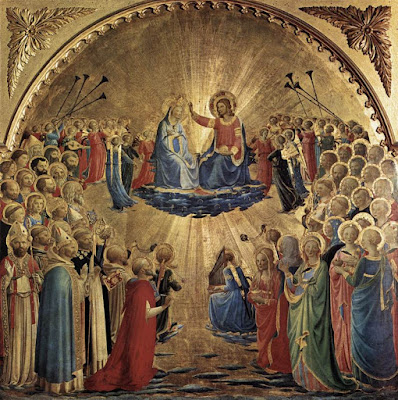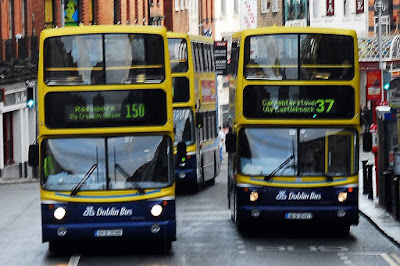‘Rejoice and be glad . . .’ Sunday Reflections, All Saints’ Day and All Souls’ Day

The Coronation of the Virgin, Fra Angelico, 1434-35
Galleria degli Uffizi, Florence, Italy [Web Gallery of Art]
Readings (New American Bible: Philippines, USA)
Readings (Jerusalem Bible: Australia, England & Wales, India [optional], Ireland, New Zealand, Pakistan, Scotland, South Africa)
Gospel Matthew 5:1-12a (New Revised Standard Version, CatholicEdition, Canada)
When Jesus saw the crowds, he went up the mountain; and after he sat down, his disciples came to him. Then he began to speak, and taught them, saying:
“Blessed are the poor in spirit, for theirs is the kingdom of heaven.
“Blessed are those who mourn, for they will be comforted.
“Blessed are the meek, for they will inherit the earth.
“Blessed are those who hunger and thirst for righteousness, for they will be filled.
“Blessed are the merciful, for they will receive mercy.
“Blessed are the pure in heart, for they will see God.
“Blessed are the peacemakers, for they will be called children of God.
“Blessed are those who are persecuted for righteousness’ sake, for theirs is the kingdom of heaven.
“Blessed are you when people revile you and persecute you and utter all kinds of evil against you falsely on my account. Rejoice and be glad, for your reward is great in heaven.”

Dublin buses [Wikipedia]
When I go home to my native Dublin I use public transport all the time. I often find God’s presence in in those around me, passengers and drivers. So does Columban Sr Mary Nolan, now based in Dublin, who worked for many years in Peru and also served a term as Congregational Leader of the Missionary Sisters of St Columban. Hereshe shares such a moment on the 150 bus – and by chance Wikipedia has a photo of a 150 bus!
Coming from the city on the 150 bus recently I shared a seat with a woman whom I had never met before. Her name is Breda. She told me she has been a widow for the past 29 years; her Dad suffers from Alzheimer’s and her Mom cares for him down in their home near Carlow. Breda’s daughter Ashling was 11 years old when her father died. There was another little girl four years younger who died of hepatitis at 7 months. Ashling was traumatized but gradually came through it and did well at her studies. She is a churchgoer, and a turning point for her was when she attended YOUTH 2000. At that youth celebration Ashling met her future husband, a young man who is spina bifida. They’re happily married since last year.
By the time I had heard that story my bus had arrived at St Agnes’ Road, where our convent is, and it was time to part from Breda. I was amazed that such a happy faith-filled woman could have come through so much suffering.
The Solemnity of All Saints celebrates the countless saints whom the Church has never canonized and never will, people who have gone before us who in their lifetime, like Breda on the 150 bus in Dublin, accepted whatever life brought, sadness and joy, believing in the love of the Lord Jesus Christ for them and in doing so being an inspiration to those around them.
I think that Ashling, Breda’s daughter, attended one of the four-day faith festivals organised each summer by YOUTH 2000. The video above is a promo for this year’s.
Songs for All Saints’ Day
Here is a rousing version of For All the Saints, words by Anglican Bishop William Walsham How and music by Ralph Vaughan Williams. The video is taken from an edition of the BBC’s weekly progamme Songs of Praise, which has been running since 1961.
A poem for All Saints’ and All Souls’ Days
Lochearnhead and Glen Ogle, Scotland [Wikipedia]
I don’t know much about the faith of Scottish poet Norman MacCaig (1910 – 1996). Wikipedia tells us that he described it as ‘Zen Calvinism’ – ‘a comment typical of his half-humorous, half-serious approach to life’.
A favourite poem of mine is Country Postman. It expresses for me something of the reality of the Communion of Saints that we celebrate and remember in a special way on these two days. I’ve no idea if Norman MacCaig was thinking of the Communion of Saints when he wrote it. But it captures something of what holds us all together as a community. With email, Facebook and all the ways of communicating in ‘this digital continent’, as Pope Benedict calls it, perhaps the role of the postman has changed, though he is still vital in rural communities, not only to deliver the mail but to keep an eye on older persons living on their own, some of whom perhaps are reclusive but who still welcome him.
The poem too catches something of the fragility in all of us, especially in those who serve the broader community quietly and generously for so many years. And could Jesus, who turned water into wine at a wedding for people like those whom this mail deliverer served, turn away this poor man who died after probably celebrating a little too much?
It is persons such as MacCaig’s Country Postman whom we remember on All Souls’ Day and it is our prayers that help them move from being numbered among All Souls to being numbered among All Saints.
Country Postman
Before he was drowned,
his drunk body bumping down the shallows
of the Ogle Burn, he had walked
fifteen miles every day
bringing celebrations and disasters
and what lies between them to
MacLarens and MacGregors
and Mackenzies.
Now he has no news to bring
of celebrations or disasters,
although, after one short journey,
he has reached
all the clans in the world.
[‘Burn’ here means ‘creek’.]
